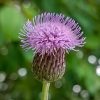A new press release from WSSA was released a few days ago. The post is related to my recent post on cotton yields in the South. From the WSSA piece:
“The current model simply isn’t sustainable,” says Stanley Culpepper, Ph.D., a professor in crop and soil science at the University of Georgia and member of WSSA. “Growers have gone to war, and they are making progress from a weed management perspective, but not from an economic or environmental perspective. We need to figure out a way to get the same result far more cost effectively and in a way that better protects our natural resources.”
Today integrated weed management programs that complement glyphosate with a variety of other weed control tools and techniques have become commonplace in cotton. Growers have added herbicides to their weed control programs that use a different mode of action than glyphosate. They also are using two approaches that may seem decidedly “old school.” More than 90 percent of cotton growers in Georgia are now hand-weeding a significant portion of their cotton crop, Culpepper says. They also are tilling more to keep Palmer amaranth at bay.
Some good information there. Check it out.


Comments are closed.